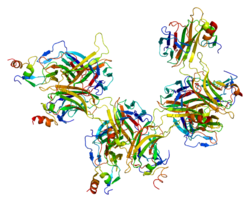Top Qs
Timeline
Chat
Perspective
B-cell maturation antigen
Protein-coding gene in the species Homo sapiens From Wikipedia, the free encyclopedia
Remove ads
B-cell maturation antigen (BCMA or BCM), also known as tumor necrosis factor receptor superfamily member 17 (TNFRSF17), is a protein that in humans is encoded by the TNFRSF17 gene.
TNFRSF17 is a cell surface receptor of the TNF receptor superfamily which recognizes B-cell activating factor (BAFF).[5][6][7]
Serum B-cell maturation antigen (sBCMA) is the cleaved form of BCMA, found at low levels in the serum of normal patients and generally elevated in patients with multiple myeloma (MM).[8]
Remove ads
Function
The protein encoded by this gene is a member of the TNF-receptor superfamily. This receptor is preferentially expressed in mature B lymphocytes, and may be important for B cell development and autoimmune response. This receptor has been shown to specifically bind to the tumor necrosis factor (ligand) superfamily, member 13b (TNFSF13B/TALL-1/BAFF), and to lead to NF-kappaB and MAPK8/JNK activation. This receptor also binds to various TRAF family members, and thus may transduce signals for cell survival and proliferation.[7]
Remove ads
Interactions
TNFRSF17 has been shown to interact with the B-cell activating factor TNFSF13B.[9][10] A conserved domain at the N-terminus, BCMA TALL-1 binding domain, is required for binding to the TNFSF13B.[9]
Clinical significance
TNFRSF17 is implicated in leukemia, lymphomas, and multiple myeloma[11] (see the "Mitelman Database" [12] and the Atlas of Genetics and Cytogenetics in Oncology and Haematology,[13]).
As a drug target
Summarize
Perspective
An antibody-drug conjugate Belantamab mafodotin (GSK2857916) has been evaluated in patients with relapsed/refractory multiple myeloma.[14] Belantamab mafodotin was approved in the United States in August 2020 for the treatment of patients with relapsed or refractory multiple myeloma who have received at least four prior therapies.[15]
Chimeric antigen receptor (CAR) T cells have emerged as an important therapy for multiple myeloma after first reports in preclinical and phase I clinical studies.[16][17] A Phase 1b/2 study of JNJ-4528, a CAR-T cell therapy directed against BCMA in myeloma patients refractory to a proteasome inhibitor or immunomodulatory drug, and who had received an anti-CD38 antibody has been completed.[18]
ALLO-715 is a CAR-T therapy by Allogene Therapeutics that targets B-cell maturation antigen (BCMA).[19] As of June 2021[update], it is undergoing clinical trials for the treatment of multiple myeloma.[20] On 21 April 2021, the FDA granted Regenerative Medicine Advanced Therapy status to ALLO-715.[21] ALLO-715 is being investigated at Memorial Sloan Kettering Cancer Center and the Mayo Clinic[22] as part of the UNIVERSAL trial for multiple myeloma, on its own and in conjunction with the selective gamma secretase inhibitor nirogacestat.[20][23]
Remove ads
References
External links
Further reading
Wikiwand - on
Seamless Wikipedia browsing. On steroids.
Remove ads







